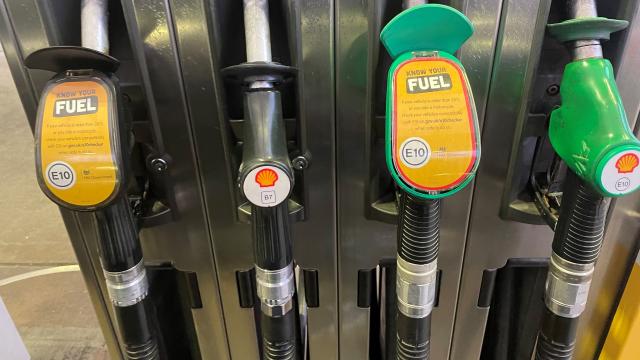
Petrol below £1.50 a litre for first time since Russia invaded Ukraine
Average petrol costs have fallen under 150p a litre for the primary time considering the fact that Russia invaded Ukraine, the AA motoring organization says. Pump costs hit 149.74p in line with litre on Monday, decrease than ultimate February and down from a document 191.53p in July. The AA stated falling international oil costs had been at the back of the drop, calling it “a large comfort for drivers”. But it stated diesel nonetheless value greater than ultimate 12 months at 172.21p a litre in comparison with 153.05p.
AA spokesman Luke Bosdet stated it now value approximately £23 much less to fill a median-sized 55-litre automobile with petrol than it did in July, at roughly £82. However, he stated petrol costs had been “nonetheless traditionally manner above” what they must be and that the stop of a transient gas responsibility reduce this March ought to result in clean rises. Petrol stations in towns and cities also are charging as much as 10p greater for gas than the ones in rural elements of the UK, he introduced.
- Filling a diesel automobile now prices a document £100
- Petrol costs drop from document highs
Fuel costs commenced to upward thrust ultimate 12 months as international locations ended Covid lockdowns however surged better while Russia – a first-rate oil producer – invaded Ukraine, sparking issues approximately international substances. By July ultimate 12 months, the value of filling a median-sized automobile had hit £105.29, in keeping with the RAC motoring organization, even as for diesel it was £109.47.
The authorities has reduce gas responsibility via way of means of 5p a litre considering the fact that February ultimate 12 months to assist drivers, with the general reduce really well worth 6p while VAT is factored in, the AA says. However, the cut price is scheduled to lead to March.
David Cox, an impartial electricity analyst, instructed the BBC that issues over international oil substances had subsided as international locations had determined options to Russian crude, sending costs decrease.
However, he warned oil costs had been in all likelihood to upward thrust once more as China eased its strict Covid policies and completely reopened its economy.
“I assume the outlook [for oil and petrol prices] is it’ll move again up. We’re in for a extended duration of better costs.”
Rising electric powered automobile prices
The information comes because the RAC stated the value of fast-charging an electric powered automobile the use of a public charging community had accelerated via way of means of approximately 50% withinside the beyond 8 months.
It now prices a median of 70.32p in line with kilowatt hour to fast fee on a pay-as-you-move basis, up from 44.55p ultimate May and from 63.29p ultimate September, the motoring organization stated.
The rises – which can be being pushed via way of means of growing electricity prices – imply that drivers now pay £36 to fee a normal family-sized electric powered automobile with a 64kWh battery to the extent required to cowl round 188 miles, it stated. However, it introduced that folks that charged at domestic had been nonetheless getting “fantastic value”, paying approximately 1/2 of as much.
The RAC’s electric powered automobiles spokesman, Simon Williams, stated slicing the extent of VAT on power offered at public chargers to 5% to healthy what human beings pay at domestic could be one manner of retaining costs beneathneath control.
“It is still the case that folks that can fee at domestic or at paintings and who do not use the general public fast charging community very frequently get terrific value – even given the especially excessive home electricity costs proper now.
“Sadly, the equal can not be stated for folks who both can not fee at domestic or at paintings, or who frequently make longer trips past the variety in their cars. There’s no doubt they should pay a long way greater, and in a few instances greater than petrol or diesel drivers do to replenish on a mile-for-mile basis.”

